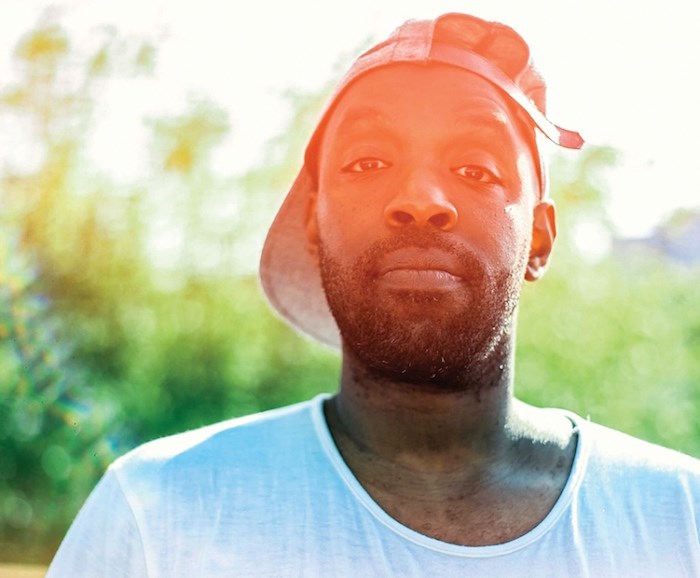With Hip-Hop Evolution, Shad and his documentary crew circle back to the origins of rap. First screened as part of the 2016 Hot Docs Canadian International Documentary Festival and then picked up by HBO Canada and Netflix, the award-winning series traces the underground roots of hip-hop and its expansion into mainstream culture.
 Shad recorded his new album, A Short Story About A War, in between assignments for the Hip-Hop Evolution series. Photo by Justin Broadbent.
Shad recorded his new album, A Short Story About A War, in between assignments for the Hip-Hop Evolution series. Photo by Justin Broadbent.
The first episode explores the birth of hip-hop on Aug. 11, 1973 at 1520 Sedgwick Ave., in the Bronx, New York City, where Clive Campbell (soon-to-be DJ Kool Herc) provided the music and MC’ed a back-to-school birthday party for his little sister Cindy. Girls got in for 25 cents. It cost the guys double. The party started at 9 p.m. Goofing around, Coke La Rock (who wasn’t yet Coke La Rock) picked up a mic and started “rapping” over his friend Clive’s funky, endless breaks.
https://www.youtube.com/watch?v=Rm3J5640jXo&feature=youtu.be
From there everything fans out in the documentary series and other rap pioneers are brought into the story including Grandmaster Flash and The Furious Five, Fab Five Freddy, Marley Marl, Afrika Bambaataa, Kool Moe Dee, Kurtis Blow, Doug E. Fresh, Whodini, Warp 9, DJ Hollywood, Spoonie Gee, The Sugarhill Gang and Russell Simmons.
Some of the interviewees became rich through their involvement with hip-hop while others never left the hood.
The second instalment in the series (which dropped Oct. 18, 2018 on Netflix) expands on the foundation story adding interviews with the likes of Public Enemy, Beastie Boys, N.W.A, Ice-T, Rakim, Big Daddy Kane and LL Cool J.
While Shad’s been working on Hip-Hop Evolution off and on for several years he’s not been neglecting his own music. A Short Story About A War, an ambitious concept album, came out in October of last year on Secret City Records.
No stranger to Vancouver, the Canadian rapper, whose full name is Shadrach Kabango, spent several years on the West Coast earning a masters degree in liberal studies from Simon Fraser University. He returns for a show on Thursday, Feb. 21 at Fortune Sound Club as part of his current tour.
He spoke to the North Shore News from the road (somewhere in Wisconsin) about working on Hip-Hop Evolution and the conceptual framework behind his new album.
North Shore News: In your Peabody Award acceptance speech you thanked HBO Canada and Netflix for supporting your ‘insanely inefficient process’ of putting everything together for the Hip-Hop Evolution series. What does the process involve?
Shad: It’s a challenging series to make because really the pioneers are the ones that tell the story. I’m there sitting with them but it’s them telling their story. It depends on the schedules of our guests but it’s worked out. Especially that first season. We got the most important pioneers: Herc and Bambaataa and Grandmaster Flash and others.
What kind of research was done for the series?
We had a research team and probably the hardest part was the writing, by Rodrigo Bascunan, because it’s a difficult story to tell. Once hip-hop expanded beyond the Bronx and New York City it spread pretty quickly so to try and find a coherent way of talking about that expansion and growth and evolution of hip hop without being reductive or getting into myth-making too much is a challenging task. It required a lot of research and then really good writing (to bring it all together).
Herc was ground zero - he and others were inventing hip-hop music. They were pulling in influences from everywhere. It didn’t exist before them.
Exactly. Herc gave hip-hop the esthetic and the fundamental features like looping sections of music. He played a lot of James Brown, Latin percussion and a lot of flavours – that’s the essential element but then people like Grandmaster Flash very quickly perfected some of his techniques and expanded on them. Once you get outside New York you see hip-hop combining with different local flavours and really starting to grow into what we recognize now.
There were local scenes and then at some point mainstream players saw what was happening and got involved. Who were some of those people?
Most famously, Sylvia Robinson and Sugarhill Records. “Rappers Delight” is really the song that introduced most people to hip-hop. I think it sold something like 20 million copies, one of the biggest selling 12-inch records of all time. That’s 1979. After that you probably want to talk about Def Jam – Russell Simmons, Rick Rubin – they signed Run DMC, they signed Public Enemy, they signed the Beastie Boys. LL Cool J. That’s the first great hip-hop label, even to this day it’s hip-hop royalty.
When do you come into the picture? Who were your influences growing up?
In high school I was listening to Common, Lauryn Hill, Outkast – artists like that. That’s mid to late ’90s. Those are my biggest influences. They took music to another level for me at that time, as a 15, 16-year-old I didn’t know there were artists that were that soulful and that personal. They had that kind of depth.
In your new album there’s a strong jazz component.
My introduction to jazz was through those artists. Hearing artists like Nas, or Common, sample jazz. A Tribe Called Quest, as well. My introduction to jazz was through hip-hop.
Your new album wraps the tracks into a conceptual framework. What’s the basis for the storyline?
It started in Vancouver, actually. Something between a story and an image just occurred to me, I guess, as I was thinking through a lot of the tensions that I was seeing while living in Vancouver. This was in 2014, and as you know Vancouver is very unequal, and I think that’s where the story came into my mind. This picture of a desert world and this war, and the different factions fighting and their different rationales for participating in violence. There is one character I call The Fool that didn’t seem to believe in any of it.
I didn’t think at that time to make an album based on that story, it was just something that occurred to me and something that I was seeing everywhere in kind of a lens through which I was seeing the world. A year or two ago when it was time to work on a new album I thought, 'let me try and make this story come to life,' because it was just something that stayed with me. It feels real.
https://www.youtube.com/watch?v=dJobkImCpkQ&feature=youtu.be
When did you record A Short Story About A War?
I made the album while we were doing a lot of filming for Hip-Hop Evolution. It was a two weeks on, two weeks off, kind of thing. I would be in the studio for two weeks and then on the road for two weeks. I think that helped the process. I find when I’m making music it’s nice to zoom in and zoom out, pretty intensely and then be able to pull back and get some perspective. Listen to what I’ve been working on and not get lost in the details.
Does zooming out also feed into the record?
That’s a good question. I think that it does. The story occurred to me while I was living in Vancouver but then I started to see it everywhere and that keeps feeding into the story. I was getting new understanding and layers of stuff as I was able to think about it more. I think it did feed into the process.
You’re bilingual. Does French factor into the creation of your own music?
Pretty much all my influences in hip-hop are English and that’s the language I work in the most. I rap mainly in English because that’s the language that I can really play with and bend the most.
You create content as a musician but also go behind the scenes and document the music with your series. That double duty seems like a rare combination of roles.
Most artists are at least amateur historians because we are fans and that leads you to be a deep listener. A lot of artists I know are kind of amateur music historians. My friends that are DJs are really deep with their knowledge of music. It feels natural to me. I am into making music as a fan. I’m not trained as a musician. I’ve learned everything I know by listening to the music.
Shad plays the Fortune Sound Club in Vancouver on Thursday, Feb. 21 at 8 p.m.



